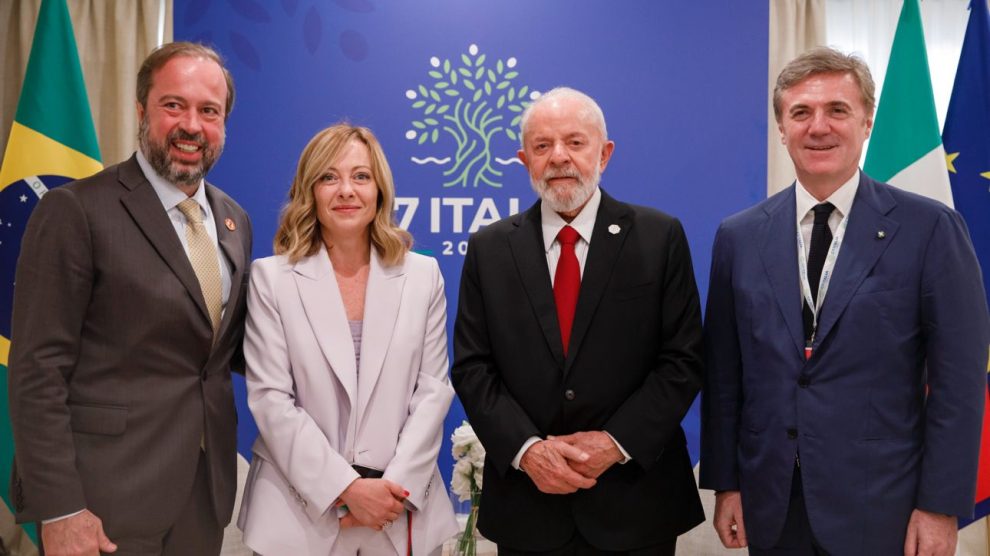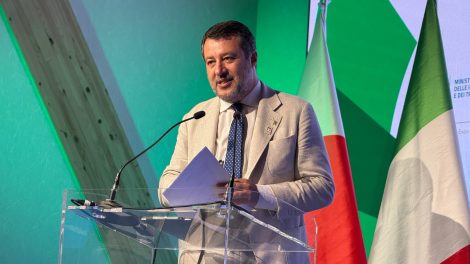Enel’s G7 triumph. The recent G7 summit in Apulia marked a crucial moment for Italian economic diplomacy, with the Italian multinational manufacturer and distributor of electricity and gas Enel at the centre of international negotiations.
- Held between June 13 and 15, the summit saw Prime Minister Giorgia Meloni show broad support for Enel’s role as a strategic bridge between Italy and major emerging economies like Brazil and Argentina.
- Through the Ministry of Economy and Finance, the Italian state is Enel’s main shareholder.
Economic diplomacy. Enel’s CEO, Flavio Cattaneo, and Director of External Relations, Nicolò Mardegan, emphasised the Italian company’s importance in the global energy landscape.
- Cattaneo joined the bilateral meeting between PM Meloni and Brazilian President Luiz Inàcio Lula da Silva. Later, he met with President Lula and Energy Minister Alexandre Silveira, focusing on expanding investments in Brazil.
- Enel committed to investing twenty billion reais over the next three years, nearly doubling previous agreements, and enhancing infrastructure to prevent future blackouts.
Climate-driven investments. This investment strategy addresses both economic needs and climate resilience. This is a financial investment and a response to climate change challenges.
- The extreme events of 2023 highlighted the vulnerability of Brazil’s electrical grids, prompting Enel to propose a 75% increase in capital expenditures to improve service quality.
- President Lula’s positive reception of these developments indicates a convergence of interests between the Brazilian government and Enel, demonstrating trust and a commitment to Brazil’s energy future.
Enel’s expanded commitment. Following extreme weather events, the Brazilian government had ordered a disciplinary procedure against the distributor. Now, the company has decided to expand its workforce in the country and increase investments in supply quality and safety.
- Lula expressed readiness to renew concession contracts with Enel in exchange for new investments, highlighting Enel’s almost doubled commitment.
- Enel executives “have made a commitment: instead of investing 11 billion reais, they will invest 20 in the next three years, ensuring that there will be no more blackouts wherever they are responsible for energy,” Lula said.
The Argentine market push. Enel has intensified contacts in Argentina with key figures such as President Javier Milei, signalling a continued interest in the Argentine market.
- In March, Enel decided to suspend the sale of Edesur, an Argentine electricity distribution company that belongs to its group, indicating heightened confidence in the new government’s deregulation plan.
- The group expressed willingness to support the energy transition and the inclusion of countries in the zero-emission global energy value chain.
The fruits of the summit. These G7 meetings accentuated Enel’s ability to act as a key player in economic diplomacy, establishing relationships beyond business to become part of national development strategies.
- The G7 demonstrated how Italy, through Enel, plays a fundamental role in redefining global energy dynamics. Meloni and Cattaneo showcased a model of private-public collaboration that could serve as an example for other countries.
- Italy also leverages its G7 position to promote sustainable growth and international collaboration, focusing on Enel’s technical expertise and investment capacity. This consolidates Italian influence in emerging economies while addressing energy and climate challenges.
The African connection. This approach aligns with the broader context of the Mattei Plan for Africa, promoted by the Italian government, which seeks to further involve Global South countries in international decision-making.
- The plan promotes inclusive and non-colonialist development, strengthening diplomatic and commercial relations and enhancing geopolitical equity.




